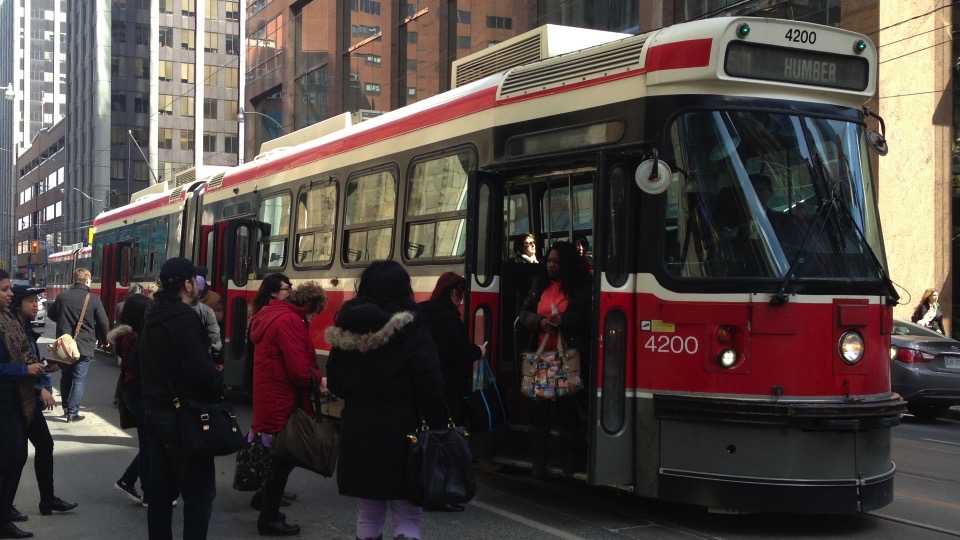As Ontario moves towards increased privatization, is the TTC next?
One day after the Ontario Liberal’s pre-election budget was released, Keep Transit Public, a campaign supported largely by the Amalgamated Transit Union, took to Facebook to call foul and request the Premier remove a sentence buried deep in the 333 page document. Under the title of ‘Regional Transportation’ on page 126 of the new provincial budget, the Ontario government commits to “explore whether major transit assets, particularly heavy rail, can be optimized with a different ownership model.” While the rest of the paragraph focuses on developing provincial ownership of the TTC to support regional transit planning, the language around investigating “a different ownership model” should be concerning to transit advocates and Toronto voters.
In fact, similar language was employed by the Liberal government in their pre-election budget in 2014 around Hydro, a now privatized public asset in Ontario. On page 169 of the 2014 budget, the government committed to investigating opportunities to optimize the full value of government assets like Hydro One, the Ontario Power Generation, and the LCBO. The budget document also reads that the government would investigate new ownership models, such as corporate recognition, mergers, and acquisitions.
So, what happens if the TTC is privatized following June’s provincial election? For proponents of privatization, including Ontario Progressive Conservative leader Doug Ford, who led Toronto’s effort to privatize garbage collection while elected to city council, privatization means paying down Ontario’s substantial debt, finding cost efficiencies, and improving services.
Privatizing the TTC to pay down Ontario’s $288 billion debt is not an original idea. In 1999, when the Mike Harris government was compromised by failing to perform on an election promise to reduce the province’s deficit, the government sold-off Highway 407, a 102 km toll-road located north Toronto. The sale which brought an initial revenue of $3.1 billion to the province, was seen largely, however, as a one-time political pay day for the province. The province not only lost the extended revenue it could have made from tolls—about $400 million annually today—but professional estimates now suggest the highway should have been valued closer to $12 billion when it was initially sold.
 Image courtesy of Driver Check
Image courtesy of Driver Check
Using the private sector to improve efficiency and service is also not a new idea to be pitched by neoliberal politicians to Ontario voters. In fact, when the Ford administration was in charge of City Hall in Toronto, the mayor and his brother argued that privatized garbage collection would extend efficiencies that the public sector failed to realize. Most notably, privatized garbage collection west of Yonge Street would avoid the inefficiencies caused by pesky unions demanding better wages and benefits for their workers.
Cases of public transportation privatization in cities like London highlight the potential consequences of privatizing systems like the TTC. In London, ten years after one third of the city’s underground was sold to a private consortium, the company in charge of the system went bankrupt. Indeed, investors, and the British government, quickly learned that farebox recovery, something the TTC relies upon heavily now, was not a sufficient sole source of revenue to fund the transit system. Even if private companies charge predatory fares in the pursuit of profits, in London it was noted users of public transit simply could not pay them, thus bankrupting the company in charge of the system and forcing the government to spend millions in subsidizing the underground train system in response.
Beyond concerns about profitability and economic saliency, perhaps the greatest apprehension to any privatization scheme should be out of concern for the impact it will have on public interest. While the TTC currently fails to operate in an acceptable fashion for the majority of its users, under a private company service could get worse. With the public interest in mind, the TTC operates lines and bus services which are not always cost efficient in the eyes of the Law of Supply and Demand. Yet, as a public operator, at least in theory, stations are opened and lines are built in a way meant to serve all members of the public.
Moreover, although the TTC may often appear to be struggling to operate with the public interest in mind, decisions about expansion and service improvements still remain in the hands of professional planners and open to public opinion. If the transit commission is handed off to a private owner this would all be lost—decisions about the future of the system would be left to a semi-transparent, profit-motivated company, unaccountable and uninterested in the public’s opinion.
It is possible the Liberals’ commitment to investigating a new ownership model is simply a well-meaning attempt to develop a “safe, reliable and seamless” regional transportation model. After all, uploading the TTC for this purpose was originally a Progressive Conservative ideal, outlined in the party’s pre-Ford election platform. Yet, if that is the case, Premier Wynne should come out and say that, making a strong commitment to not privatize further public assets if re-elected in June.
Disclosure: James Chapman is the Volunteer Director for a local NDP campaign.

The budget document also reads that the government would investigate new ownership models, such as corporate recognition, mergers, and acquisitions.